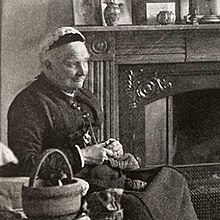Rose Weigall
Lady Rose Sophia Mary Weigall or Rose Sophia Mary Fane (September 5, 1834 – February 14, 1921) was a British literary editor and biographer.
Rose Weigall | |
|---|---|
 | |
| Born | Rose Sophia Mary Fane September 5, 1834 |
| Died | February 14, 1921 |
| Nationality | British |
| Occupation | literary editor and biographer |
| Title | Lady |
| Spouse(s) | Henry Weigall |
Life
Weigall was born in London. Her parents were Priscilla Anne Fane (born Wellesley-Pole) and John Fane. They were Lord and Lady Burghersh and she was the last of their nine children. Her mother's uncle was the Duke of Wellington. In 1841 she moved to Berlin where her father was a minister and she and her family were there until 1851 when they moved to Vienna where her father was the British ambassador during the Crimean war. In Vienna she wrote to Princess Luise of Prussia continuing a friendship that was to be a lifelong correspondence between them. She also continued her education meeting the leading people of the day and more formally with supported by German and Swiss tutors.[1]
When her father, who was then the eleventh earl of Westmorland, died in 1855, she moved with her mother to London. There she met William Gladstone, Palmerston and Henry Weigall.[1] Weigall was a popular portrait painter.[2] They married and they would have seven children including only one daughter, the cricketer Gerry Weigall[3] and Sir Archibald Weigall in 1874 who was later governor of Australia.[1] They bought Southwood House in Ramsgate as the family home in 1880.[4]
Her family as the Earls of Westmoreland had a country residence at Apethorpe in Northamptonshire and she took these responsibilities seriously recognising her own advantages. An article she wrote in 1869 spoke of 'Our friends in the village' which included the poor people of Apethorpe. She also had concerns in Europe, but she never went abroad after her marriage. She was aware of the need to keep her mind active and she gave her time to history, correspondence and literary interests. She would write and her ideas were published in Macmillan's Magazine. Under the encouragement of Queen Victoria she wrote a biography of Princess Charlotte[1] who had died in childbirth. It was titled A Brief Memoir of the Princess Charlotte of Wales and she presented a copy to the Queen in August 1874.[5]
Weigall died at Southwood in Ramsgate.[1]
References
- "Weigall [née Fane], Lady Rose Sophia Mary (1834–1921), literary editor and social worker". Oxford Dictionary of National Biography. doi:10.1093/ref:odnb/55695. Retrieved 2020-07-23.
- "Weigall, Henry, 1829–1925 | Art UK". www.artuk.org. Retrieved 2020-07-24.
- "Weigall, Gerald John Villiers (WGL889GJ)". A Cambridge Alumni Database. University of Cambridge.
- "Southwood House". www.ramsgatetown.org. Retrieved 2020-07-23.
- "Lady Rose Weigall (1834-1921) - A Brief memoir of the Princess Charlotte of Wales : with selections from her correspondence and other unpublished papers / by the Lady Rose Weigall". www.rct.uk. Retrieved 2020-07-24.